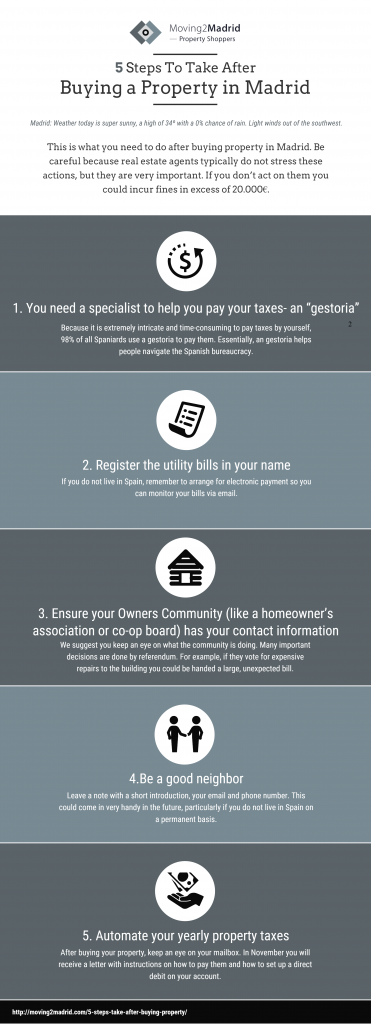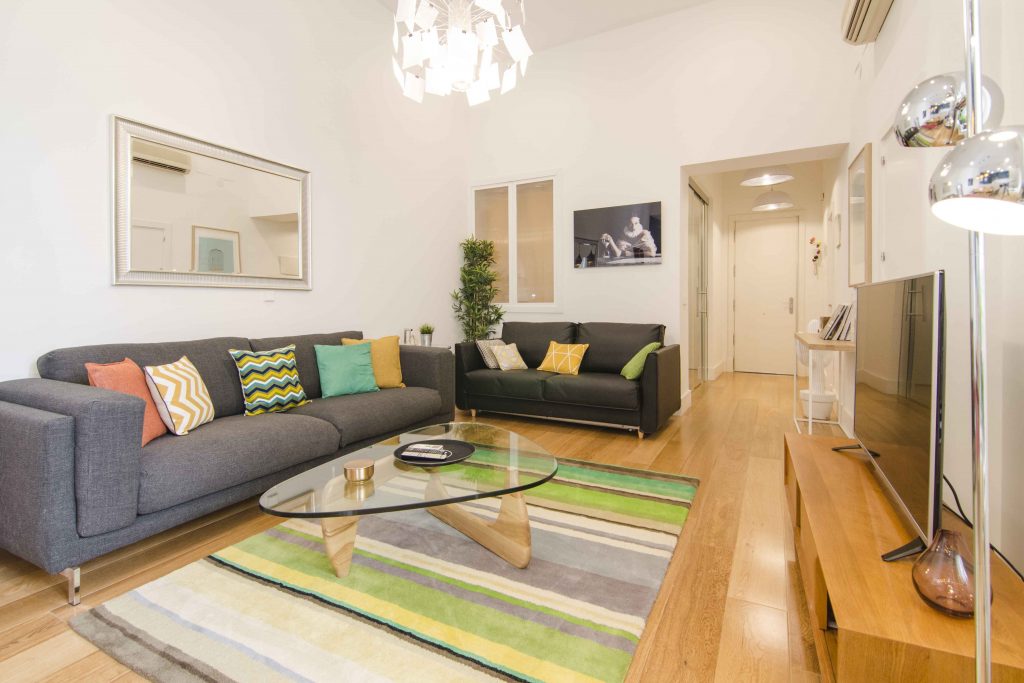5 steps to take after buying property in Madrid
After months of searching, you finally bought your flat in Madrid. You paid the notary, signed the contract and now you have the keys. The notary warned you about a bunch of things you need to do, but you didn’t quite follow the details. No problem! We will clarify everything for you. This article explains, in detail, all the actions you need to take after buying property in Madrid. Be very careful as often real estate agencies do not stress these actions, but they are very important. If you don’t act on them you could incur fines in excess of 20.000€.
1—You need a specialist to help you pay your taxes- an “gestoria”
The most important thing you need to do after buying your property in Madrid is to pay your taxes. Because it is extremely intricate and time consuming to pay your taxes by yourself, 98% of all Spaniards use an gestoria to pay them. You can think of an gestoria as a tax payment company, but they do other things as well. Basically, they help people navigate the Spanish bureaucracy.
Question: Exactly why do you need a special company just to make a simple payment?
Well, because there is a lot more involved. In order to correctly register the property in your name, these gestorias also need to:
- Go to the notary and collect the signed deeds
- Pay the notary on your behalf
- Bring the deeds to the local property registry
- Pay various other taxes at the local property registry*
- Demonstrate that they have paid the main taxes on your half.
*These taxes differ by region of Spain. For example in Madrid they are 6.7%, which is the lowest in Spain. For comparison, they are 12% in Valencia. Click here to learn about other unseen costs of buying an apartment in Madrid.
After all of the above happens, the registry needs to do its complicated bureaucratic work. This takes another 2-3 weeks. Once that has happened, your gestoria can then go back to the registry and collect the final registered deeds (Nota Simple).
Remember: the importance of this document is relative. You can ask for a copy of it at any time. There are also ways to prove the ownership of any property via the Internet (it’s an online version of Nota Simple).

2—Register the utility bills in your name
This might sound obvious but as we like to say, everything seems obvious and then you make a mistake! Remember to change the utilities to your name: gas, electricity, telephone, internet, community fees and water (these last two almost always go together).
Hint: After buying property in Madrid it is often much cheaper to keep the utilities in the seller’s name. The alternative is to cancel everything and pay installation fees to have everything put in your name. It is not only cheaper to keep the seller’s contacts, it is also 10 times faster. Remember: this is Spain! People smile a lot but they’re not always the fastest. This practice may seem odd to a non-Spaniard, but it is commonly done.
Note: If you do not live in Spain, remember to arrange for electronic payment so you can monitor your bills via email.
3—Ensure your Owners Community (like a homeowner’s association or co-op board) has your contact information
Regarding the community, it is important that you email them so they can have your contact information. I would suggest you keep an eye on what the community is doing. Many important decisions are done by referendum. For example, extraordinary repairs might be needed, they may need to install an elevator or undertake some other type of expensive work. Often communities demand for a direct debit of your account, so you need to remain vigilant. Make sure you know what the community is voting on and when. If you are not able to vote, we recommend you delegate your vote to a trusted neighbor. If you need help understanding community fees, or how owners communities work, we can assist you! Book a free consultation now.
4—Be a good neighbor
As a courtesy, we strongly recommend introducing yourself to your neighbors. Leave a note with a short introduction, your email and phone number. This could come in very handy in the future, particularly if you do not live in Spain on a permanent basis. If you reside abroad, you will most likely need to ask your neighbors a countless number of small favors! So, after buying propety in Madrid make friends with the people in your building- you will thank yourself later.

After buying property in Madrid, we recommend you make friends with your neighbors. Perhaps invite them for a coffee in your beautiful new living room?
If you decide to rent your flat, either for short or long term, then you really should make a point of introducing yourself to them in person- at least the ones on your floor and the floor beneath your flat. Here’s an important tip about living in Spain: you will see that people often feel the need to complain about little things. Given the opportunity to do so, they generally quickly forget the issue. If you give them a tool, your contact information, they can send you an email and they will feel better. More importantly, in the event of an emergency (a leak, etc), it is extremely beneficial for your neighbors to be able to locate you immediately. To be safe, we suggest you consider leaving a pair of keys with a trusted neighbor, the doorman or a nearby friend.
5—Automate your yearly property taxes
I.B.I. stands for Impuestos Bienes Inmuebles (a.k.a. Property Taxes). After buying property in Madrid, keep an eye on your mailbox. In November you will promptly receive a letter with instructions on how to pay them and how to set up a direct debit on your account. If you will not be in Spain in November, you can go to the relevant office prior to your departure and set-up the automatic payment directly. Property taxes in Spain always range from 120€ to 400€. This is not a significant amount, but it needs to be paid. You can easily outsource this too. Unless you are very fluent in Spanish and very familiar with the Spanish tax system, I suggest you hire an accountant to do this tax on your behalf. It should not cost more than 100-150€ for a once in a lifetime payment setup. We have trusted accountants if you need a referral.
In summary, these are the 5 steps to take after buying property in Madrid:
- Get a specialist to help you pay your taxes
- Register the utility bills in your name
- Connect with your Owners Community
- Make friends with your neighbors
- Automate your yearly Impuestos Bienes Inmuebles
Some of these can be elaborate, and are best done with the help of a Gestoria. If you need help understanding the above steps, or would like to references for a good gestor, or wish to learn more about buying property in Madrid, don’t hesitate to contact us or request a free consultation. We are here to help you.
Posted on 6 June, 2017 by Pierre-Alban Waters in Paperwork - Buy, New? Start Here






[…] from the property purchase price and mortage fees, there are additional fees that must be paid in taxes, to the Notary and the Land Registry. These amount to roughly 10% of the purchase […]
[…] a property is bought and sold, all changes are made in the escritura, which is the deed to the property. It is signed by both buyer, seller, their lawyers and the […]
[…] from the property purchase price and mortage fees, there are additional fees that must be paid in taxes, to the Notary and the Land Registry. These amount to roughly 10% of the purchase […]
[…] is not just a property shopper. Buying an apartment in Spain requires a certain amount of bureaucratic paperwork. This is further complicated if a client obtains a Spanish mortgage, or sets up a Spanish company […]